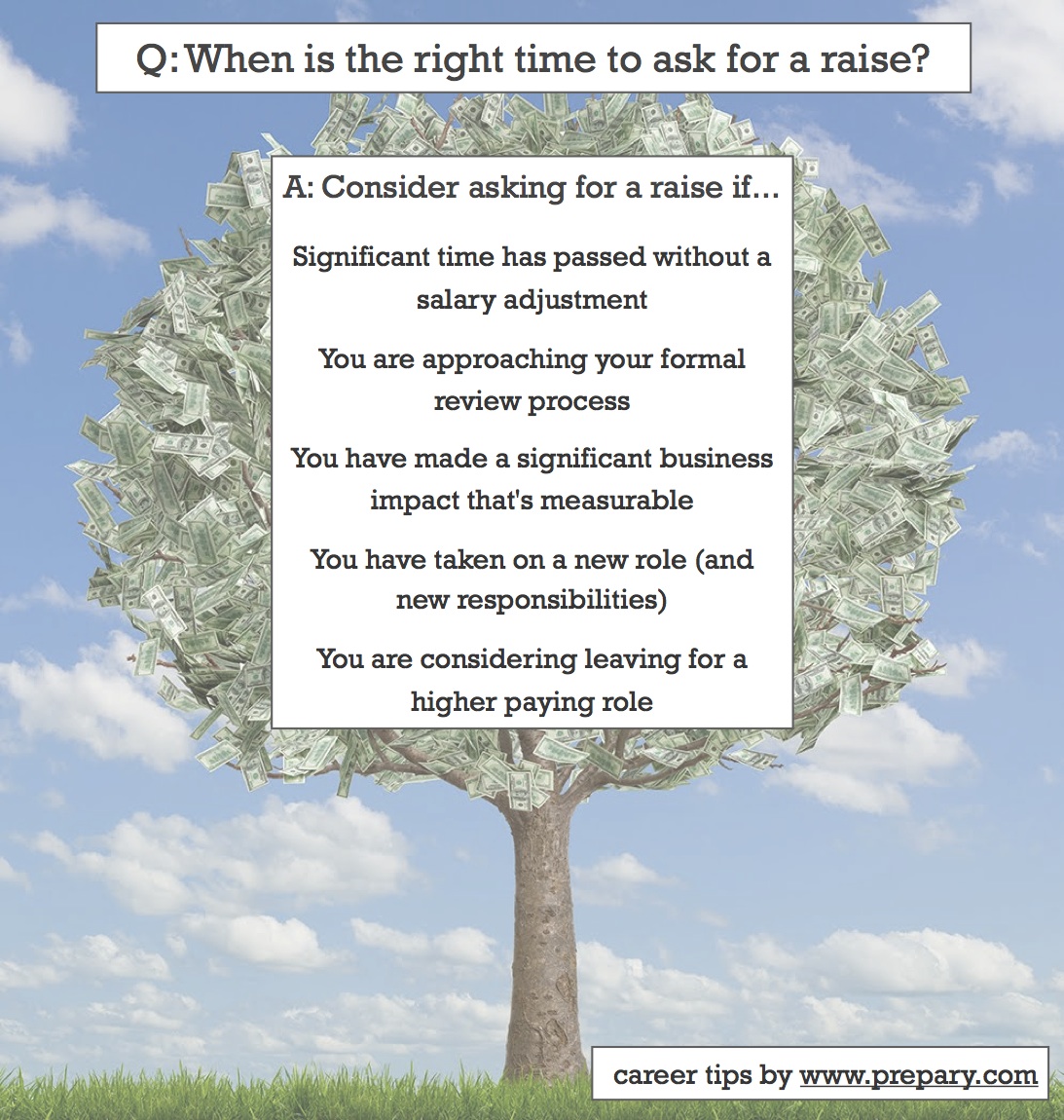After you’ve started a job, you spend time coming up to speed, forming relationships, and getting to the point where you can master the job. Then you get into the groove and time flies. You take on more responsibilities, you get better, and you make a real impact on the business. The big question becomes, when is the right time to ask for a raise?
All companies handle compensation changes a little bit differently but there are a few main times when you should consider asking for a raise.

Now to elaborate a bit on each of these points… These may be good reasons to ask for a raise.
- Significant time has passed without a salary adjustment – If more than 2 years have gone by since you’ve started and you haven’t gotten a significant salary increase, it may be the right time to ask for one. The “cost of living” increase changes each year but is usually around 3%. After you’ve put in a handful of years at a company, you may want to push for a more sizable adjustment than that. Keep in mind, you’ll still have to explain why you deserve one.
- You are approaching your formal review process – The time around the formal performance management process is usually a good time to bring up compensation (if it’s on your mind already) because that is generally when companies make these decisions (also tied in with your performance). Of course, you’re going to be more likely to get a raise if you’ve performed well over the year versus if you haven’t. Since each company handles compensation changes differently, make sure you know the “policy” and when changes are (logistically) possible.
- You have made a significant business impact that’s measurable – If you are in a role where you can prove your impact with tangible numbers or evidence, you may have leverage to ask for a raise. Keep in mind this business impact should be the kind that is above and beyond what was originally expected of you. If you can prove your value and unique skills, you may find yourself in a good position to ask for a raise.
- You have taken on a new role (and new responsibilities) – If you have been promoted in title and/or responsibility but have not gotten a monetary adjustment, you have every right to ask for one. Whether it’s picking up some slack after your boss left, inheriting new projects, or getting promoted, organize a list of everything new you are managing and present your case.
- You are considering leaving for a higher paying role – If you are considering leaving your company for monetary reasons alone, it’s important to give someone the heads up (i.e. “I really love working here but I’ve gotten calls from other companies paying much more” type of conversation). If your manager knows that your compensation is that serious of an issue for you, they may try to prevent you from leaving (by giving an increase). However, the risk here is that your manager is willing to let you go and get paid more elsewhere which could create an awkward situation. If you are really valuable to the organization though, they won’t want to lose you to a competitor over a few dollars.
Regardless of why you are asking for a raise, here are a few tips on how to handle the conversation:
- Come prepared – Whether you have market data from competitors, a powerpoint of your contributions, or anything else, make sure you prepare for this conversation. It will have a direct impact on if you get more money.
- Give a heads up – No one likes to be blind-sighted by a conversation like this. Instead of putting your manager on the spot, schedule time and let them know what the meeting is going to be about.
- Always be gracious and respectful – You never want to come across as entitled or “bratty” during a conversation like this. Make sure you show your appreciation for your job, the opportunities, and your manager while you are asking for a raise.
- Don’t make it personal – Always bring your work and accomplishments into this type of conversation but never make it personal. It’s not your manager’s problem that you have an addiction to shoes or need a nicer apartment, and it won’t help your case





